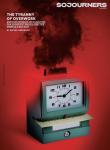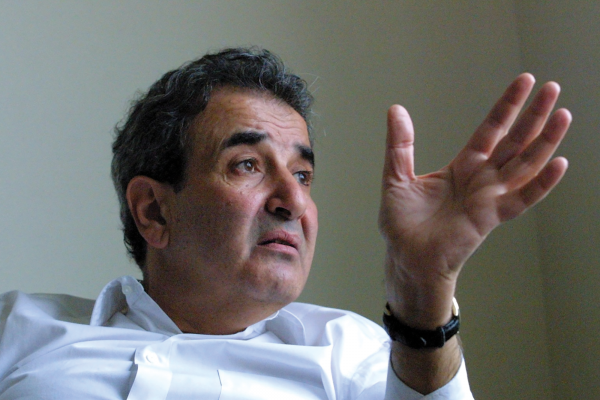HISTORY HAS PAID personal attention to Lawrence Joseph, a Maronite Catholic from Detroit. In 1967, when Joseph was 19 and just finished with his freshman year at the University of Michigan, his father’s grocery-liquor store was looted and burned during the Detroit Rebellion. The five-day uprising of Black people reacting in part to police abuse and brutality and its fierce suppression by law enforcement and the National Guard made him “acutely conscious of America’s deeply systemic violence.”
Joseph, a poet who was also a lawyer who taught at St. John’s University in Queens, N.Y., and at Princeton, was living a block from the World Trade Center in 2001 when the two planes attacked. He and his wife had to evacuate their apartment. It was weeks before they could return. In the title poem of his 2017 volume So Where Are We?, Joseph writes:
flailing bodies in midair—
the neighborhood under thick gray powder—
on every screen. I don’t know
where you are, I don’t know what
I’m going to do, I heard a man say;
the man who had spoken was myself.
The unspecified“you” almost certainly refers to his wife, from whom he was separated during the attack. Readers familiar with his work, but not with his life, could be forgiven for having surmised another “you,” one we find in the poem’s closing stanzas: “Ten blocks away the Church of the Transfiguration, / in the back a Byzantine Madonna—/ there is a God, a God who fits the drama / in a very particular sense.”
“In each book,” Joseph said, “I develop and repeat certain general themes: time, place, memory, God, history, class, race, beauty, love, poetry, identity.”
An Arab-American of Syrian and Lebanese descent, Joseph, author of seven books of poetry, most recently A Certain Clarity: Selected Poems (2020), writes of his childhood, “Before the altar of God / I spent hours on my knees.” Among most contemporary readers of poetry, Joseph says, God would not rank high thematically. “A reader will pick up a book, see the word God, and not want to read it,” he laughs, unperturbed.
The 73-year-old, plain-spoken and scruffy-bearded (unlike his dignified book jacket photos), fits the image of a poet of the prophetic left, albeit with less ecclesiastical baggage than his predecessors, Thomas Merton and Dan Berrigan. He admires a wide range of poets: Peruvian César Vallejo, for reasons moral and political, Wallace Stevens for his aesthetics, Adrienne Rich on every level, and also Robert Hayden and Gertrude Stein.
During his fellowship at Cambridge, he became obsessed with Albert Camus. “Camus was not a pacifist, but he was nonviolent.” He saw in Camus another branch on the tree of nonviolent Catholicism, possessing the crucial element of “moral conscience,” a phrase he first came across in the introduction to a volume by Polish poet Zbigniew Herbert (another poet he admires). “There it is!” Joseph thought: a confirmation of the direction in which he’d been heading.
“Vietnam was occurring during Vatican II,” he emphasizes. Racial violence as well. “This was all part of the same thing.” The thing is the “American imperium.” Those words, unarguably heavy, roll easily off Joseph’s tongue. They kick up a lot of dust in his poetry. But the human dimension is not overlooked. His poem “In the Age of Postcapitalism” begins:
The disabled garment worker
who explains to his daughter
he’s God the Holy Spirit
and lonely and doesn’t care
if he lives or dies.
Much gets written in our post-9/11 world about the physical and psychological violence endured by Arab Americans. It is therefore eye-opening to read Joseph’s accounts of growing up in the late ’50s and ’60s when the United States was preoccupied with its Asian wars. People of Arab descent may not have made headlines at that time, but making themselves disappear into the diverse American landscape was not easy. Raised in a home that was a transplanted Lebanese room redolent of olives, onions, lamb, and kousa, Joseph says that out in the street he was sometimes called “sand n——.” In a poem of that name he notes: “Outside the house my practice / is not to respond to remarks / about my nose or the color of my skin.”
Joseph’s poetry also addresses themes related to the violent lands his grandparents left, and the violent country they became part of. So Where Are We? could easily serve as the title for every one of his volumes. In light of decades of U.S. obsession with reshaping Middle East politics, his poetry could be classified as essential reading.
He reads aloud his poem “The Game Changed” with a voice that disrupts the stillness of the day—that grabs you and doesn’t let go.
I hear the Maronite Patriarch
dares the Syrians to kill him, no word
from my grandfather’s side of the family
in the Shouf. “There are circles here”—
to quote the professor of international relations and anthropology—
“Vietnam, Lebanon,and Iraq ... Hanoi, Beirut, and Baghdad.”
Joseph can at times bring a refreshingly jaundiced eye to his burdensome role of witness to a generation of military and economic violence that by now is so normalized that it generates a paralysis of indifference. In his poem “Some Sort of Chronicler I Am,” he points to his churning of “emotional perceptions and digressions, / choler, melancholy,” to which he adds the need at times “to see everything simultaneously.” About the anger in his work, he concludes the poem “It’s Not Me Shouting At No One” with an intriguing caveat: “It’s not me shouting at no one / in Cadillac Square: it’s God / roaring inside me, afraid / to be alone.”
In a review in Commonweal, the late Michael True, a Catholic nonviolence scholar and activist, reflected on Joseph’s poetry through these lines from Stanley Kunitz’s The Testing Tree: “the heart breaks and breaks / and lives by breaking. / It is necessary to go / through the dark and deeper dark / and not to turn."

Got something to say about what you're reading? We value your feedback!







